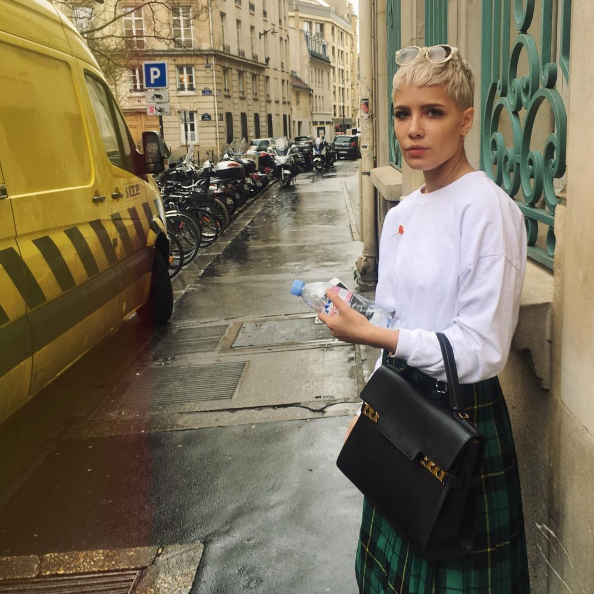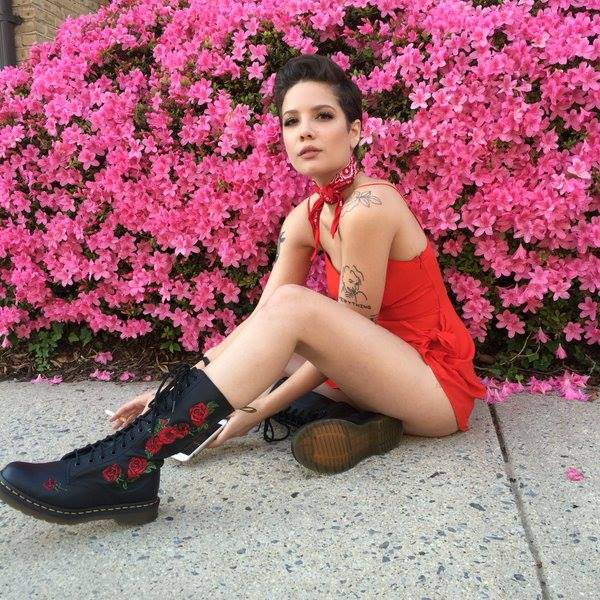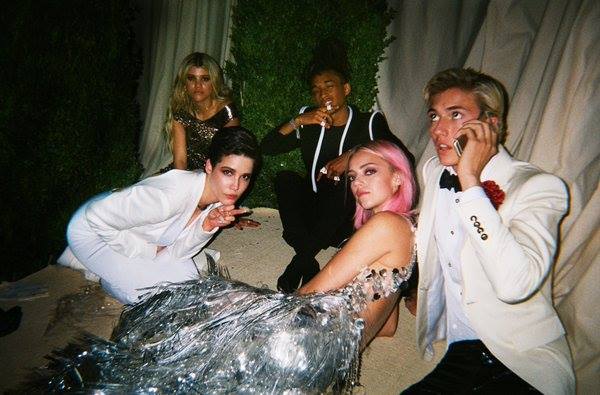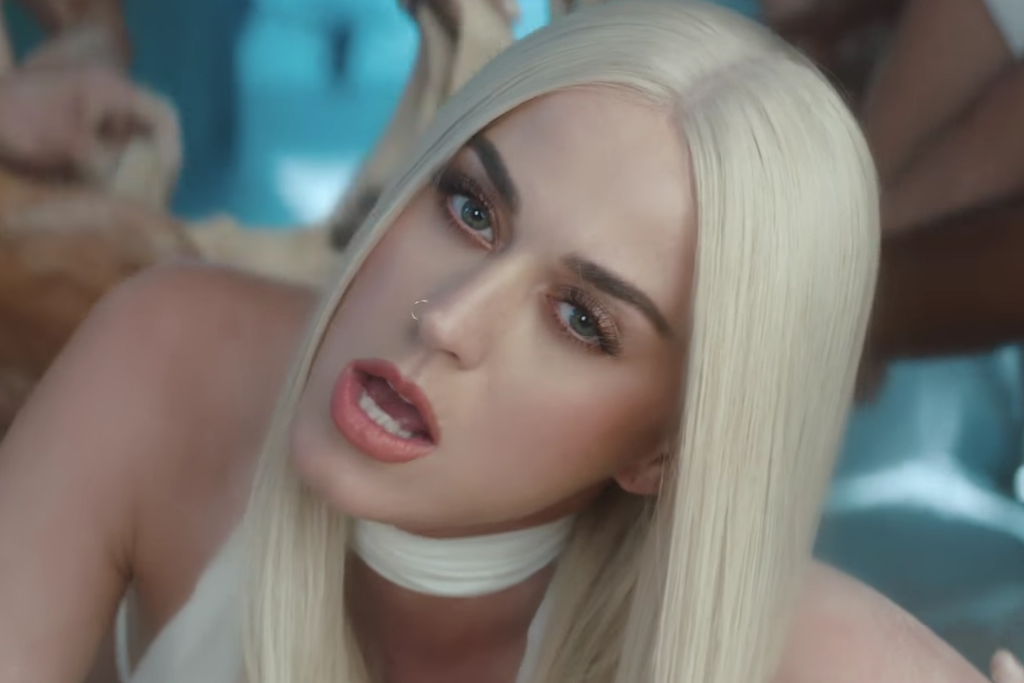Halsey: “I Had To Learn How To Stop Treating The Press Like My Personal Therapist”
--

Ashley Frangipane doesn’t do handshakes. No, she’s not a difficult, ‘diva’ celebrity type — as it turns out, quite the opposite. At the end of a whirlwind press junket somewhere in the confines of the EMI/Universal building in Woolloomooloo, the 22-year-old singer and songwriter better known as Halsey brushes aside any formalities with her interviewers and goes straight for best-friend level affection.
“Hi, I’m Ashley!” she beams, going straight for a hug. We’ve never met, but Halsey is already treating this like some sort of catch-up. “How are you? How have you been? Oh my God, I love your bag. I love cute shit!” It’s an immediately warm, welcoming and positive environment — all from the vibe of someone who’s been in the room for less than a minute and will only spend roughly ten minutes there before being promptly whisked away for yet more promotional endeavours.
It’s through this brief insight that one properly sees what it is that has made Halsey such an emotionally-charged figure within the realm of pop music. Many on the outset will only know her as the female counterpart of ‘Closer,’ The Chainsmokers’ 2016 global smash, in which she plays the Kiki Dee to Andrew Taggart’s Elton John.
On her own accord, however, she’s made a considerable splash on the back of tracks like ‘New Americana,’ from her 2015 debut Badlands; as well as ‘Now or Never,’ from her 2017 follow-up hopeless fountain kingdom. The music of Halsey is bright and adventurous, while also containing a darker side that lingers even when the chorus hits. It’s intriguing, complex and probably far more layered than most would ever give it credit.
As a makeshift studio set-up is broken down behind her, Halsey makes the most of her brief time with Music Junkee; talking about her inspiration, the visceral fan reaction to her songs and a head-scratching line from ‘Closer.’
You’ve said in the past that you had thought of the name Badlands before you had even written the record. As luck would have it, hopeless fountain kingdom is also a location-based title. Was this a similar vision of conceptuality?
I write about places a lot. I like the idea of being able to create some sort of world — I loved comic books growing up. I was so into Marvel and I loved this idea of all these characters with a back-story, and a city that has a history. I like incorporating that into my work — taking my own life and making myself a character in another universe.
I also think I write about places a lot because I feel trapped sometimes. I think some of my songs are about me feeling trapped in a state of mind. Badlands is kind of about me being in this depressive state — I felt like I couldn’t escape, that there was nothing for me anywhere else and I was stuck there. With hopeless fountain kingdom, I had this feeling of hopelessness within a relationship.
I think making it about places makes it easier. It gives my audience a better idea of just how trapped I feel. I want them to see that I’m really in this place.

Photo: Instagram
There are a lot of bigger, grander themes and concepts on hopeless fountain kingdom. Religion and mythology play their part, as do the works of Shakespeare. Were these things that you were reading into and seeing elements of your own personal life reflected in them?
I think so. The cool thing about things like mythology and Shakespeare is that they’re universal concepts. They’ve been talked about since the dawn of time, and people have been studying them for centuries. [laughs] And here I was, going through a break-up, and feeling like I was the only person that had ever experienced heartbreak like this!
I realised it’s part of the human condition. It’s just something that happens to people, which is why I tapped into Shakespeare and into mythology. Also, it adds this real sense of grandiosity to it all. I love mythology’s use of monsters and gods… this idea of beings that are greater than human. It’s really interesting, I find, to talk about a human thing but be making reference to things that are bigger and greater than that.
Through both Badlands and hopeless fountain kingdom, you’ve made revealing and introspective music — which itself has been bolstered by some incredibly revealing profiles and articles that feature in-depth interviews with you. The Halsey narrative is one where people know more or less everything about you that there is to know. Do you have any reservations or regrets when you reflect on said narrative?
Oh my gosh… all the time. I say sometimes that my experiences are like a tangible thing — like a hard object. I’ll give it away to someone, and then immediately I’m like “No! Give it back!”
I don’t know… I definitely had to learn how to stop treating the press and my fans like my personal therapist. They’re not — I have one of those. [laughs] Sometimes, talking something through is how you figure out how you feel about it. I’ve gotten better about putting it into my art.
“I feel like I only talk about personal things now if there’s a greater good or a goal to be achieved”
When you write a song, people can listen to it and understand what you’ve been through and then move on. When you tweet something out or say it in the press, they respond. They get to have an opinion on something that happened to you. You want to be like, “That’s not yours to have an opinion on!” [laughs] “I wanted to tell you, I didn’t want you to answer me!”
It’s a very juvenile mindset — that I should be able to tell you something and you shouldn’t be able to tell me your own opinion. I had to figure that out the hard way — it’s like, “Oh, people have an opinion about everything.” Understood!
I think I had to get a better understanding of the way I talk about things. I feel like I only talk about personal things now if there’s a greater good or a goal to be achieved. If I know it can help someone, that it can bring awareness to something, it could give my fans a sense of solidarity or relatability. That’s how I make lemonade out of lemons, for lack of a better saying, about my own personal experiences. This is a shitty thing that has happened to me, but if it can help other people then I’m going to tell you about it.
On the note of solidarity and relatability with your fans, one can only imagine the kind of fan correspondence you get after being so direct and honest about things from your own life. It must get quite intense at times to read some of the things people have sent to you.
Definitely. Really intense. Fans don’t really realise how much it affects an artist. Let’s say I meet 50 people at a meet-and-greet. In that 50, I’ll have some fans tell me I helped them through self-harm, suicidal ideation, their eating disorder, coming out or leaving an abusive relationship.
I’m so happy that I’ve gotten to be that for those fans, but it brings a real emotional weight. I’ve learned how to carry that with me. They all think that I’m helping them, but they don’t realise that they’re helping me. At the end of the day, I know what I’ve been through — and to hear so many people say they have too helps me to feel less alone. I think that’s the new therapy for me.

Photo: Facebook
The idea of art as catharsis is a bigger part of pop music than most would think. One can assume you came out of writing hopeless fountain kingdom a very different person to the one you were going into it.
Oh my gosh, unbelievably. We talked about records being destinations before. My records are often not about the destination — they’re about where I was before.
Badlands is where I was before I escaped that negative, destructive mentality. hopeless fountain kingdom is where I was before I left this relationship — before I became a more confident person, who loves themselves and chooses themselves. There’s an irony in that, as well — I have to go on stage and sing about who I used to be; not where I am now. There’s vindication in that, and there’s catharsis in that, this idea that you’ve conquered something.
“Artists are such a paradox, man. You’re so insecure — if you weren’t, you wouldn’t make art”
Life imitates art. I didn’t realise that I was over it and that I had moved on from my relationship until I’d finished the album. When I finished it, I was like… [exhales a sigh of relief]. I went back and re-listened to the songs and found all of these themes: me as a powerful woman, me breaking free, me noticing all these destructive things. I didn’t even realise I was saying it. It was like, “Woah.” It was almost subconscious. It was just how I was feeling at the time.
Artists are such a paradox, man. We’re like “I don’t want you to know anything about me — but also, here’s everything you need to know about me. I don’t care what anyone thinks — but also, please like this album very much.” You’re so insecure — if you weren’t, you wouldn’t make art. You make art because you want to be validated, but you also have to be courageous enough to put that art out.

Photo: Joachim Johnson
Has there been any songs or lyrics from this record or the previous one in which you’ve had a very clear idea of what it’s about, only to get told by a listener or a critic or whomever that they’ve heard it and interpreted in a way that’s completely different?
That happens all the time. Sometimes, my fans will see correlations in things and they’ll be like, “Did you plan this?” I’m like, “No! I’m just writing about my life!” Of course there’s going to be consistencies — I’m still the same person I was when I was 19, I’ve just lived through different things. If I felt like the moon at 19, then I still feel like the moon now –– even if I’ve met the sun. There’s always parallels.
I’ve learned to let go of that as a writer. That’s a big thing that you need to achieve — letting other people have other interpretations of your art. This is what it means to me, but once it out there it can mean whatever you want it to. It can be whatever it needs to be for you, both literally and non-literally.
There’s a song on hopeless fountain kingdom called ‘Strangers,’ and it’s about being in a relationship with a woman where it goes from being really loving to strictly physical. We weren’t asking one another how our day was, we weren’t holding hands or going on dates… we weren’t even kissing on the mouth. We were just hooking up, and that sucked.
Here’s the thing: I’ve had straight men tell me they relate to that song. I’ve had gay men tell me the same thing. I’ve even had asexual fans tell me they relate to it, because that sense of intimacy goes beyond the sexual intentions in this song. That’s really special to me. I can’t set rules – if it means something to you, then it means something to you.
On that note, this final question actually happens to concern a lyric in a song you’re involved with…
Sure.
Can you talk us through the logistics of stealing a mattress?
Okay, so the way I like to explain this is like this. Picture a college dorm… do you have that here?
Sort of. University is a bit more prevalent here than college. It’s something we’ve definitely seen in movies and stuff like that, though.
Right, yeah, like a bunch of students living together. So, like, if you were running away with your partner, then you’d ransack the house. Anything that’s expensive or that you’d want to take with you because you can’t get it anywhere else, you’d take it. That’s a really common thing — if you’re in college and your room mate moves out, you’ll come back to find all of your shit missing. Books, shoes, Xbox, all that sort of thing.
Smaller stuff, sure. A mattress, though? That’s gotta be more than a one-person job. They’re quite difficult to manoeuvre around.
You’re totally right. We didn’t think that one through, did we? We should have changed the lyric to being about “the Xbox that you stole.”
Could have gotten a sweet sponsorship out of it, too.
[laughs] Yeah! Noted. I never got my Range Rover, now that I think about it. Then again, I don’t really want one. Also, I don’t drive. What am I saying?
You can say whatever you want! That’s the power of pop music.
Truly! I think that was far more poignant than either of us realise.
—
David James Young is a freelance writer and podcaster. He tweets at @DJYwrites.
